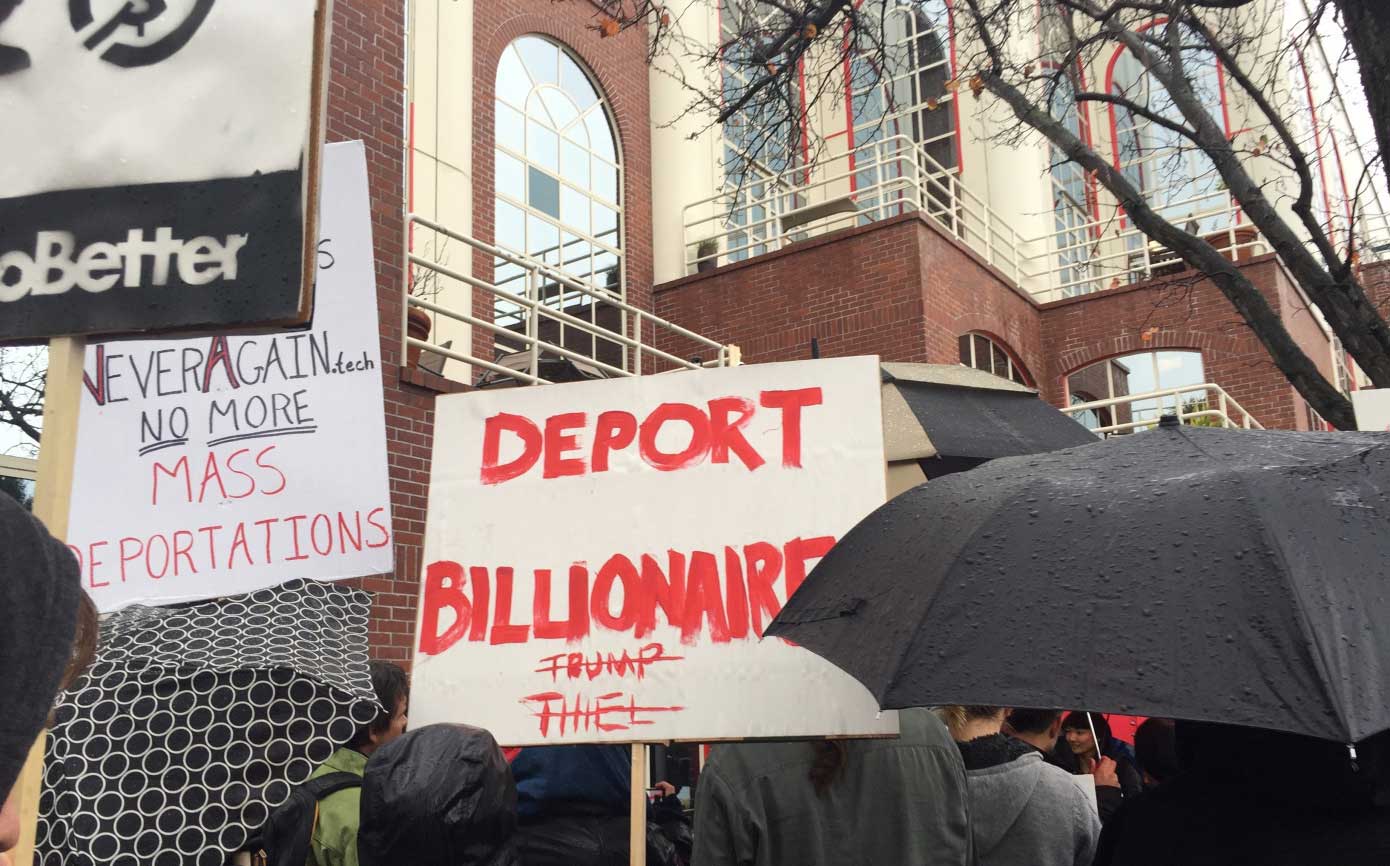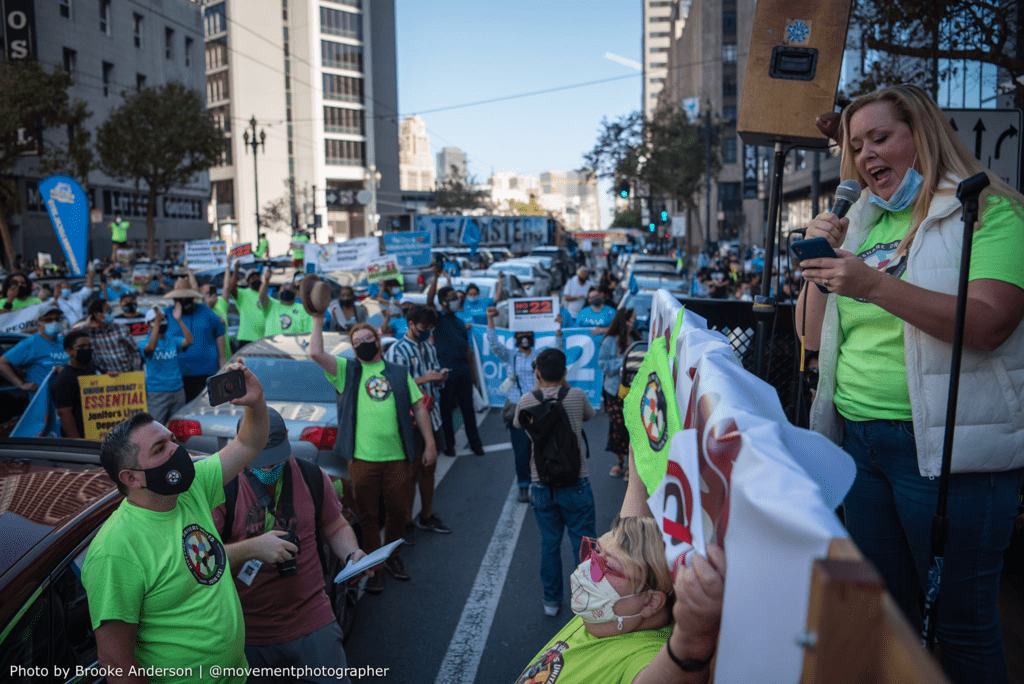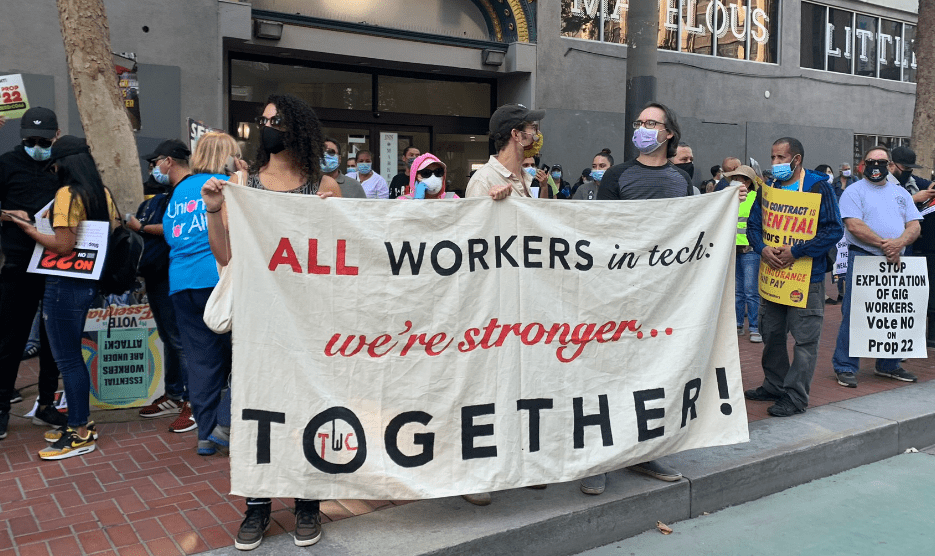Issue 12: White Supremacy in Silicon Valley
16 Oct 2020
In this issue, Becca Lewis, an academic researcher and former tech worker, describes how far-right radicalization is present in tech companies and how it dominates the industry. Also, Californians: vote No on Prop 22, the latest gig company ploy to deny workers their rights.

Tech workers protest in front of Palantir HQ / Source
The Worker’s Perspective
By Becca Lewis
I’m an academic researcher studying the politics of technology, and for several years I’ve been tracking white supremacist movements and how they operate online. I’ve analyzed how the alt-right has used mainstream media and social media platforms to amplify their propaganda. I’ve researched the crisis of far-right radicalization on YouTube and the way the platform has failed to address it. In the process, I’ve pissed off a lot of internet Nazis, “intellectual dark web” gurus, and social media companies alike.
It’s a weird way to make a living, and it’s not what I expected I’d be doing with my life.
I spent the first half of my twenties working in tech on the East Coast, and at the time, I thought I’d be doing that forever. But the longer I stayed in the industry, the more disillusioned I became. I started to experience sexism, I realized the long hours I was working were exploitative, I saw the racism that my friends and colleagues of color had to endure. I also came to terms with the fact that I am a self-righteous book nerd at heart, and I decided that instead of working in technology, I’d research it as a grad student.
Ironically, I moved to Silicon Valley after I’d left the tech industry, when I started my PhD at Stanford. Living in the Bay Area, I’m constantly reminded of the fact that we can’t understand white supremacy on social media platforms without understanding the depths of racism and sexism that permeate the tech industry itself. Silicon Valley has always been a home to a thriving white supremacist culture: white supremacy has shaped the technologies we use and structured the labor forces that build them, arguably more than liberal and progressive influence.
Maybe most famously, billionaire Peter Thiel is a lifelong libertarian who aggressively supported Donald Trump’s campaign. A recent exposé found he also hangs out with prominent white nationalists. He funds alt-right adjacent figures, such as James O’Keefe, a man devoted to “exposing” the mainstream media through lies and manipulation. Another of his mentees is Curtis Yarvin, one of the developers of the alt-right adjacent “neo-reactionary movement,” based on an anti-egalitarian, anti-democratic, reactionary worldview and a call for a return to monarchy. While these groups remain a minority in Silicon Valley, their connection to power figures like Thiel show their outsized influence.
Meanwhile, a much more diffuse and less explicit kind of white supremacy permeates tech culture in the Valley. Even people who are not white supremacists may use their power in ways that reinforce white, male power in society. Sometimes we see this in the technologies that get built with blithe ignorance of the social and political implications: the surveillance technologies that get used against protesters; the predictive policing tools that help law enforcement target Black communities; the AI tools that unintentionally recreate elements of 19th century-style phrenology; the social networks that foster calls for civil war and rising fascism.
Sometimes we see it in the structure of the labor force. During the pandemic, billionaires made a disgusting amount of money even as an often-invisible underclass of precarious workers struggled to get by: the Lyft, Uber, and Instacart drivers fighting for employment status; the warehouse and factory workers facing unsafe and inhumane working conditions; and the Amazon Mechanical Turk workers whose work is consistently rendered invisible, just to name a few. These workers who keep Silicon Valley running are much more likely to be people of color, immigrants, and people outside of the United States.
Sometimes we see it in the social landscape of the Bay Area more broadly: the gentrification, the housing crisis, and the related rise in unhoused populations (which tech figures publicly write about with disgust). This spring, I learned for the first time that Facebook hired its own police force in Menlo Park, which disproportionately impacted the black and Latino communities of East Palo Alto – one of the last gentrifying areas of the Valley.
We can even see it in the Bay Area’s history. The area’s original inhabitants, the Ohlone people, were displaced by Spanish missionaries who settled here in the 18th century. By the 1850s, with California entering the Union, the state sanctioned genocides against the native population. In the early 1900s, Stanford University became one of the driving forces in the American eugenics movement (which, in turn, led to the forced sterilization of over 60,000 people and later helped inspire Nazi Germany).
None of this is to say that these injustices are inevitable or unchangeable. To the contrary. Peter Thiel claims Silicon Valley is intolerant of conservatives, but what I suspect he’s actually noticing are the rumblings of the people fighting back. The Google employees walking out in protest of sexual harassment. The gig workers organizing against California’s anti-labor Proposition 22. The undergraduates at Stanford and other universities who have pledged not to work for Palantir unless it ends its own contracts with ICE. The whistleblowers and internal protesters pressuring companies against taking contracts with ICE. When workers and students come together to push back against racist policies and exploitative products, they can win.
In May, I joined a group of Black Lives Matters protestors in East Palo Alto, and we marched over the 101 freeway into downtown Palo Alto. The residents of East Palo Alto have been struggling with gentrification for the past several years, as tech giants swoop into the area, raise the cost of living, and support increased policing. Their struggles were front of mind as we walked all the way down University Avenue and rounded the corner onto Alma Street, where we began marching past the Palantir offices. But reflected in those windows, I saw the march in action and felt those same rumblings that scare Palantir’s founders so much: a vision of a better Silicon Valley, one that challenges white supremacy, online and off, and works toward a more just society.
In The News
California voters: vote NO on Prop 22!
Yesterday, hundreds of drivers from around California joined a caravan that arrived in front of Uber HQ in San Francisco to stage a rally against Prop 22. Nearly 100 cars blocked Market Street, accompanied by a mariachi band and drivers hanging a banner on the building saying “Prop 22 = Uber’s Prop to Exploit Drivers - VOTE NO on Prop 22”. We stand with Rideshare Drivers United and other driver-led groups organizing for a fair, dignified, and sustainable rideshare and delivery industry.

Photo by Brooke Anderson (@movementphotographer). Erica from Rideshare Drivers United shares her experience of being bullied by Uber and Lyft. / Source

TWC volunteers at the rally hold up a banner that says 'All workers in tech: we're stronger together!'
Don’t believe the Yes on 22 hype! At the end of the day, Prop 22 is a way for Uber, Lyft, DoorDash, Instacart, and Postmates to exempt themselves from their responsibility to their workers as mandated by law. All this talk about “flexibility” is just a PR campaign to distract from what’s really a corporate power-grab, allowing these companies to continue underpaying workers for the benefit of their shareholders. In fact, Kurt Nelson, a former Uber driver and current Uber engineer, wrote his own perspective saying, “Uber’s Prop 22 is a multimillion dollar effort to deny these workers their rights.”
Want a quick explainer? Designalily breaks down Prop 22 on Tik Tok, and The Guardian explains Prop 22 in the context of employee rights. Curious about the “independent contractor” vs “employee” distinction in other industries? ProPublica investigates a call center company applies the Uber model to customer service, which demonstrates the absolute necessity of building worker power in all sectors. Want deeper analysis? Forget Uber citing “a study from Berkeley” – that’s the Berkeley Research Group, their Las Vegas-based polling firm. Instead, read the UC Berkeley Labor Center study on five aspects of Prop 22; despite claims Prop 22 will guarantee drivers 20% above minimum wage of $13/hr, drivers will only get $5.64.
In stark contrast to these starvation wages, Uber and friends backed Prop 22 with nearly $200m, making it the most expensive ballot proposition in state history. So where’s that money going? If you live in California, you might have received flyers from fake, faux-progressive organizations with no members, propped up purely to promote Prop 22. You might have received something in your groceries, too: last week, Vanessa Bain, an Instacart shopper and organizer with Gig Workers Collective, opened her app to find instructions for including Yes on 22 stickers in bags. She tweeted,
Unbelievable. @Instacart is now requiring Shoppers to do the uncompensated work of distributing Prop 22 propaganda to customers —against our own self-interests. Even if (big if) this is legal, it is reprehensible and establishes a dangerous precedent for workers. #NOonProp22
Instacart told Vice it’s a one-time thing.
In History
Video game voice actors face endless racism, sexism, and psychological stress, similar to the discomfort and danger typically found in Hollywood. Around 6,000 of them are members of SAG-AFTRA, the Screen Actors Guild-American Federation of Television & Radio Artists. And on October 21st, 2016, they went on strike – facing off against 11 video game developers and publishers including Disney, Electronic Arts, and WB Games.
The actors picketed both in-person and online. Finally, on September 23, 2017, SAG announced a tentative agreement: $75 bonus payments for recording sessions up to $2,100, as well as measures to protect workers in stressful conditions like acting with profanity or racial slurs, violence, sexually explicit scenes, and dealing with obscure technical jargon.
It was the first unionized strike in the video game industry, and longest strike in the history of SAG-AFTRA – 340 days.
In Song
Dead Kennedys - Nazi Punks Fuck Off
Ten guys jump one, what a man
You fight each other, the police state wins
Stab your backs when you trash our halls
Trash a bank if you’ve got real balls
You still think swastikas look cool
The real Nazis run your schools
They’re coaches, businessmen and cops
In a real Fourth Reich you’ll be the first to goNazi punks
Fuck off!